英语服务类职业模块unit-1 - 副本
- 格式:ppt
- 大小:13.16 MB
- 文档页数:12
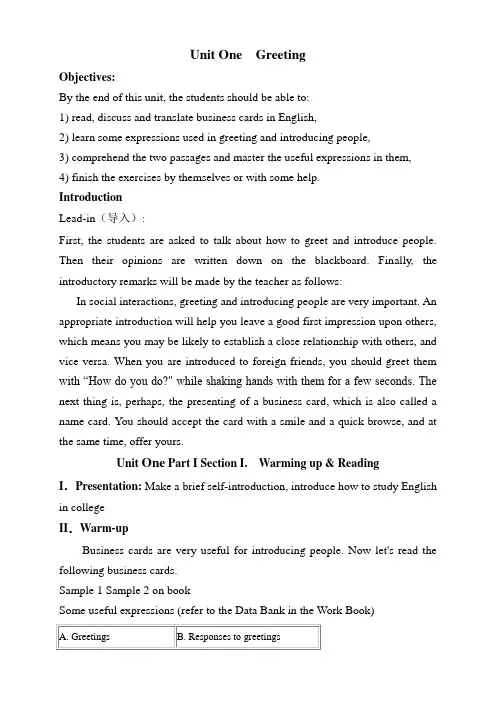
Unit One GreetingObjectives:By the end of this unit, the students should be able to:1) read, discuss and translate business cards in English,2) learn some expressions used in greeting and introducing people,3) comprehend the two passages and master the useful expressions in them,4) finish the exercises by themselves or with some help.IntroductionLead-in(导入):First, the students are asked to talk about how to greet and introduce people. Then their opinions are written down on the blackboard. Finally, the introductory remarks will be made by the teacher as follows:In social interactions, greeting and introducing people are very important. An appropriate introduction will help you leave a good first impression upon others, which means you may be likely to establish a close relationship with others, and vice versa. When you are introduced to foreign friends, you should greet them with “How do you do?" while shaking hands with them for a few seconds. The next thing is, perhaps, the presenting of a business card, which is also called a name card. You should accept the card with a smile and a quick browse, and at the same time, offer yours.Unit One Part I Section I. Warming up & Reading I.Presentation: Make a brief self-introduction, introduce how to study English in collegeII.Warm-upBusiness cards are very useful for introducing people. Now let's read the following business cards.Sample 1 Sample 2 on bookSome useful expressions (refer to the Data Bank in the Work Book)III.Read the passageAsk the students to skim the passage.IV.Analyze the passage, and explain the language points and difficult sentences.(In this step, some related information will be provided for the students.) Formation of Common English NamesA common English name is usually composed of two or three parts: the first name is also called forename. If the person is a Christian, his first name will be given at his baptism, so it is also called the given name or the Christian name. Middle name is the second given name. When written, middle name is often shortened to the initial letter. Surname is often the father’s family name, so it is also called family name or last name. For example: Anne Louise Strong, George W. Bush.Ask the students to skim the passage and answer the questions.①. What does an informal greeting really mean to Americans?②. Why don’t most Americans like using titles in introductions?③. What do your American friends want to show when they address you with your first name?④. Why do Americans ask you some personal questions?Analyze the passage, and explain the language points and difficult sentences(1) Explanation of Difficult Sentences①(Title) The Way American GreetAnalysis: In this title, "in which" is omitted after The Way.“in… way” means (to do something) by means of a certain method. Translation: 美国人的致意方式Example: I think the way she studies is worth studying.②(Para. 1) Speaking of …time, I’ve got to run.Analysis: "Speaking of" is a present participle clause used as an adverbial of cause/time. It means “when it comes to time, I’m reminded of …”Translation: 说到时间,我得赶紧跑了。
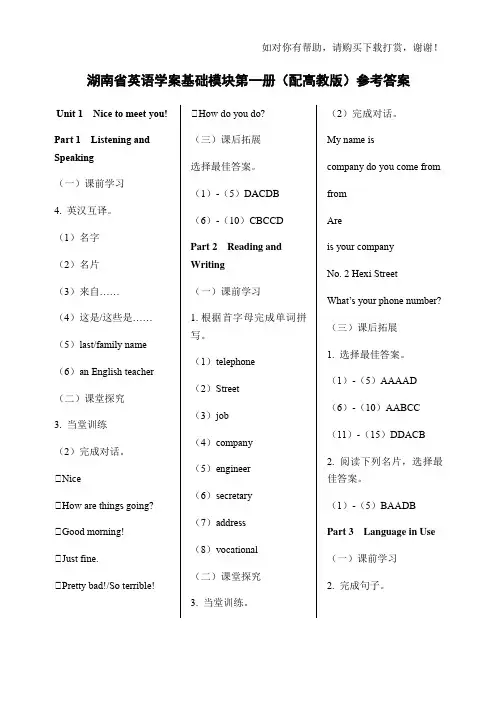
湖南省英语学案基础模块第一册(配高教版)参考答案Unit 1 Nice to meet you!Part 1 Listening and Speaking(一)课前学习4. 英汉互译。
(1)名字(2)名片(3)来自……(4)这是/这些是……(5)last/family name (6)an English teacher (二)课堂探究3. 当堂训练(2)完成对话。
①Nice②How are things going?③Good morning!④Just fine.⑤Pretty bad!/So terrible!⑥How do you do?(三)课后拓展选择最佳答案。
(1)-(5)DACDB(6)-(10)CBCCDPart 2 Reading andWriting(一)课前学习1.根据首字母完成单词拼写。
(1)telephone(2)Street(3)job(4)company(5)engineer(6)secretary(7)address(8)vocational(二)课堂探究3. 当堂训练。
(2)完成对话。
My name iscompany do you come fromfromAreis your companyNo. 2 Hexi StreetWhat’s your phone number?(三)课后拓展1. 选择最佳答案。
(1)-(5)AAAAD(6)-(10)AABCC(11)-(15)DDACB2. 阅读下列名片,选择最佳答案。
(1)-(5)BAADBPart 3 Language in Use(一)课前学习2. 完成句子。
(1)am a student(2)My father is anengineer.(3)Is(4)doctor; patients(5)Are they teachers?No, they are doctors. (二)课堂探究3. 当堂训练。
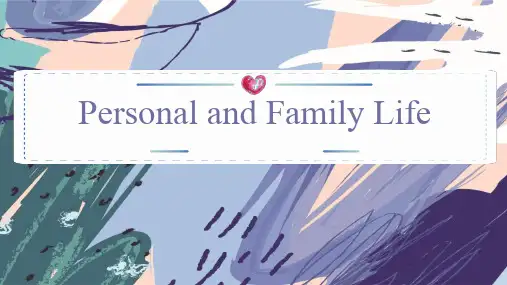
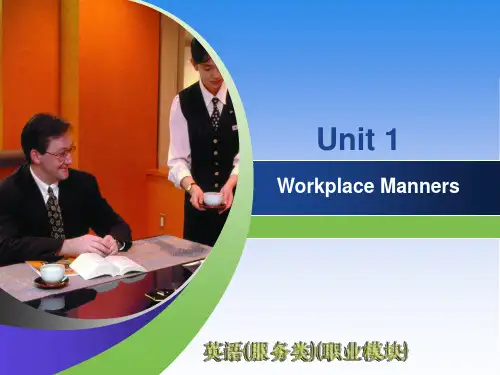
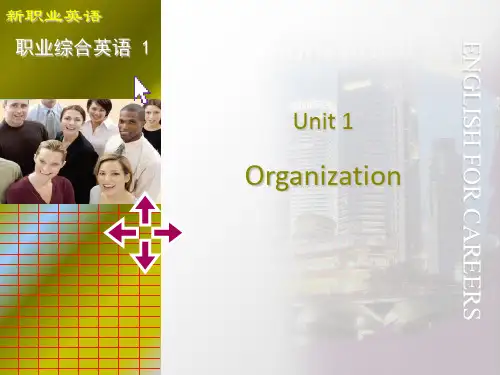

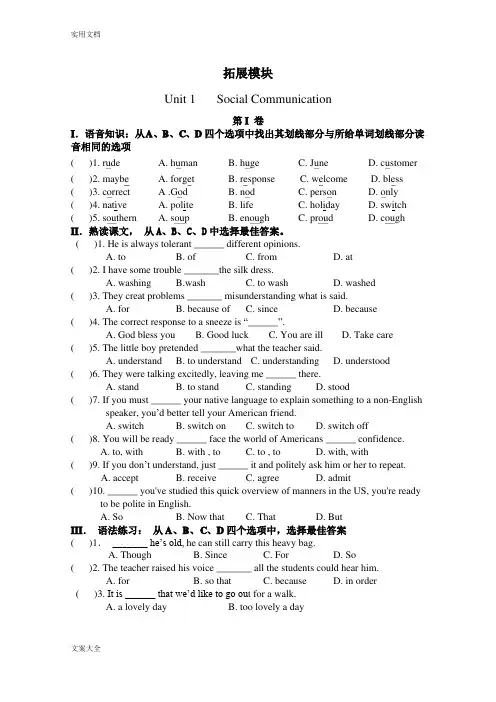
拓展模块Unit 1Social Communication第I卷I.语音知识:从A、B、C、D四个选项中找出其划线部分与所给单词划线部分读音相同的选项()1. rude A. human B. huge C. June D. customer()2. maybe A. forget B. response C. welcome D. bless ()3. correct A .God B. nod C. person D. only()4. native A. polite B. life C. holiday D. switch ()5. southern A. soup B. enough C. proud D. cough II.熟读课文,从A、B、C、D中选择最佳答案。
()1. He is always tolerant ______ different opinions.A. toB. ofC. fromD. at()2. I have some trouble _______the silk dress.A. washingB.washC. to washD. washed()3. They creat problems _______ misunderstanding what is said.A. forB. because ofC. sinceD. because()4. The correct response to a sneeze is“______”.A. God bless youB. Good luckC. You are illD. Take care()5. The little boy pretended _______what the teacher said.A. understandB. to understandC. understandingD. understood()6. They were talking excitedly, leaving me ______ there.A. standB. to standC. standingD. stood()7. If you must ______ your native language to explain something to a non-English speaker, you’d better tell your American friend.A. switchB. switch onC. switch toD. switch off()8. You will be ready ______ face the world of Americans ______ confidence.A. to, withB. with , toC. to , toD. with, with()9. If you don’t understand, just ______ it and politely ask him or her to repeat.A. acceptB. receiveC. agreeD. admit()10. ______ you've studied this quick overview of manners in the US, you're ready to be polite in English.A. SoB. Now thatC. ThatD. ButIII.语法练习:从A、B、C、D四个选项中,选择最佳答案()1._______ he’s old, he can still carry this heavy bag.A. ThoughB. SinceC. ForD. So()2. The teacher raised his voice _______ all the students could hear him.A. forB. so thatC. becauseD. in order()3.It is ______ that we’d like to go ou t for a walk.A. a lovely dayB. too lovely a dayC. so lovely a dayD. such lovely a day()4. Mary had ______ much work to do that she stayed at her office all day.A. suchB. soC. tooD. very()5. _____ she goes, there are crowds of people waiting to see her.A. WhereverB. HoweverC. WhicheverD. Whoever()6. You must speak louder ______ you can be heard by all.A. so thatB. in order toC. becauseD. such that()7. ______ well you can drive, you must drive carefully.A. So long asB. In order thatC. No matter howD. The moment()8. If we work with a strong will, we can overcome any difficulty, ____great it is.A. whatB. howC. whateverD. however()9._______ he’s very young, _______ he knows several languages.A. Though, butB. Because, soC. Though, /D. Because, / ()10. _____ I suggest, he always disagrees.A. HoweverB. WhateverC. WhicheverD. WhoeverIV.完形填空:Last summer, my wife Jane and I went to visit the town where we both grew up. We 1there since we were married ten years ago.2,we went to the neighborhood where my wife spent her childhood.It hadn’t changed very much. The house3she was born was still there, but it was now a different color. The same neighbors still lived next door. They were very glad to 4Jane, and asked us to come in and have a cup of coffee. We learned about all the neighbors, old and new. Jane had a very good5. As fast as one question was answered, she would ask the next. “What happened6the Dunbars who used to have the little yellow house on the corner?”,“Who bought the old Johnson place in the next block?”,“Do Fred and Martha still live down the street?”,“What about Miss Burton who7in that extremely big house around the corner?”Then we went to see the neighborhood where I grew up. What a8! It was all changed. All the old houses I remembered were9and in their place were some very modern ones. I didn’t know any of the people who10there.() 1.A. hadn’t been B. wasn’t C. haven’t been D. didn’t be() 2. A. At the very beginning B. First C. Firstly D. For the first time() 3. A. that B. / C. where C. which() 4. A. find B. know C. meet D. see() 5.A. time B. ask C. home D. question() 6. A. with B. to C. for D. about() 7. A. live alone B. lives lonely C. lived alone D. stayed lonely() 8. A. disappoint B. disappointing C. disappointed D. disappointment () 9.A. gone B. ruins C. there D. the same() 10. A. worked B. stayed C. studied D. livedV.阅读理解AEducation for Japanese children is free for the first nine years and all children must go to school six years of primary schooling and three years of secondary schooling. In the primary and secondary schools,about99.9per cent of school-age children are present. School usually begins at 8 o'clock in the morning and ends at 3 o'clock in the afternoon on weekdays and at noon on Saturdays. The school begins in April and ends in March. There is a summer holiday in August and a winter holiday during the New Year season.After nine years of schooling,students can enter the three-year high school by passing an examination and by paying a small charge each year.After high school, students can go on to study at various types of colleges, usually for four years. There are also two-year junior colleges.() 1. The passage mainly discusses about ______.A.colleges in JapanB.free education in Japancation in Jap anD.school time in Japan() 2. How many days have the Japanese students to go to school every week?A.Not known.B.Four and half days.C.Five days.D.Five and a half days.() 3. If a student wants to go to a high school in Japan, he or she must ______.A.pay a large amount of moneyB.study at primary and secondary school for 9 yearsC.take part in (参加) the exam and pay a little moneyD.pass the exam and pay a little money() 4. What is mentioned in the passage?A.Types of colleges.B.Perio ds for different schoolings.C.The teaching staff (教职员工).D.The number of children attending schools.() 5. According to the passage what is true?A.Almost all Japa nese children have school education.B.Japanese schools have three vacationsC.Japanese children have freedom to choose schools.D.Weekdays are from Monday to Sunday.BFrom a plane we can see the fields, cities, mountains or seas below. If we go intospace, we see more and more of the earth. People and man-made satellites have been sent out into space to look at the earth carefully and people have learnt more about the earth in the last few years.The sea looks very beautiful when the sun is shining on it.But it can be very terrible when there is a strong wind.The sea is very big. It nearly covers three quarters of the earth. The sea is also very deep in some places. There is one place and at that place the sea is about 11 kilometers deep. The highest mountain in the world is about9 kilometers high.If that mountain was put into the sea at that place, there would be still 2 kilometers of water above it!In most parts of the sea, there are many kinds of fishes and plants. Some live near the top of the sea. Others live deep down. There are also a lot of small living things, and lots of fishes live by eating them.The sea can be very cold.When people go down,the sea becomes colder and colder.Only some men can go down into the deep sea.But,in1970,five women scientists (科学家) lived in the deep sea for fourteen days.()6. This passage is_________.A. a short storyB. for science readingC. a piece of newsD. a report()7. The sea covers about _______of the earth.A One third B. One fourthC. Two quartersD. Three fourths()8. _______are not mentioned (提及) in this passage.A. IslandsB. FishesC. PlantsD. Living things()9. Which of the following is NOT true?A. The sea is usually beautiful when the sun is shining.B. The sea is always very terrible when the wind blows hard.C. The highest mountain is in the deepest place of the sea.D. The deeper the people go into the sea, the colder they will feel.()10. The last sentence “But, in 1970, five women scientists live d in the deep sea for fourteen days.” means that________.A. women wanted to live in the deep sea for a long timeB. women could go deeper into the sea than menC. women liked living in the deep sea better than menD. women could do the same work as men第II卷I.单词拼写:根据下列句子及所给汉语注释,在横线上写出单词的正确形式1. No matter what we said, he______(假装)that he knew nothing about it.2. The ________(观众) enjoyed every minute of the performance.3. The naughty boy ________(承认)that did it with his father’s help.4. Sorry,I can’t __________(解释)why I am engaged in that job.5. The best way to practice English is to talk with a _________(本国的) speaker. II.词形变换:用括号内单词的适当形式填空1.I became________(annoy)when I felt that he pretended to understand what Imeant.2.He _____(polite)asked the man to give a correct response.3.Work hard and you’ll have _________ (confident ) to face the challenge of life.4.The boy felt _____(lose)when he heard something he didn’t understand.5.She created some problems because of _______(misunderstand) what her boss said. III.词义搭配:从B栏中选出A栏单词的正确解释A B() 1.tolerant A. man, woman or child, not an animal() 2. rude B. say or do something again() 3. native C. sudden burst of air from the nose and mouth() 4. repeat D. accepting what one doesn’t like() 5. human E. belonging to or being the place of one’s birth() 6. conversation F. fit, right() 7. admit G. informal talk() 8. sneeze H. agree to the truth of usually something bad() 9. suitable I. an answer or an action done in answer() 10. response J. not politeIV.补全对话。
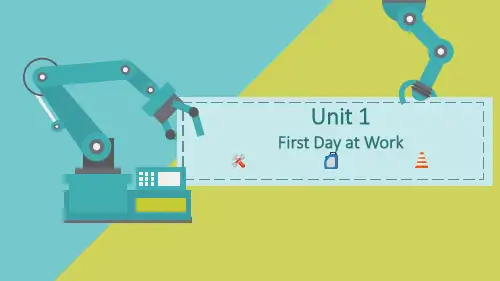
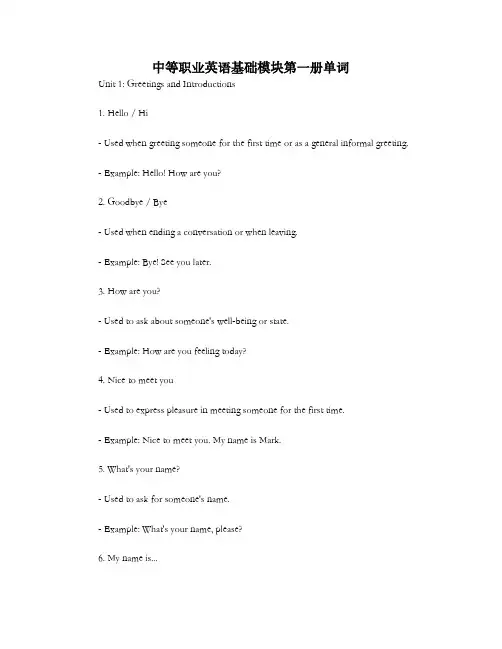
中等职业英语基础模块第一册单词Unit 1: Greetings and Introductions1. Hello / Hi- Used when greeting someone for the first time or as a general informal greeting. - Example: Hello! How are you?2. Goodbye / Bye- Used when ending a conversation or when leaving.- Example: Bye! See you later.3. How are you?- Used to ask about someone's well-being or state.- Example: How are you feeling today?4. Nice to meet you- Used to express pleasure in meeting someone for the first time.- Example: Nice to meet you. My name is Mark.5. What's your name?- Used to ask for someone's name.- Example: What's your name, please?6. My name is...- Used to introduce oneself and provide the name.- Example: My name is Emily. Nice to meet you.7. Where are you from?- Used to ask about someone's place of origin.- Example: Where are you from originally?8. I'm from...- Used to state one's place of origin.- Example: I'm from France. What about you?9. How old are you?- Used to ask about someone's age.- Example: May I ask how old you are?10. I'm... years old.- Used to state one's age.- Example: I'm 25 years old. How about you?Unit 2: Numbers1. Zero- The numerical symbol representing the value of nothing or no quantity. - Example: There are zero seats available.- The numerical symbol representing the value of a single unit or entity. - Example: I have one sister.3. Two- The numerical symbol representing the value of two units or entities. - Example: I need two cups of coffee.4. Three- The numerical symbol representing the value of three units or entities. - Example: I have three cats.5. Four- The numerical symbol representing the value of four units or entities. - Example: There are four chairs in the room.6. Five- The numerical symbol representing the value of five units or entities. - Example: I have five fingers on each hand.7. Six- The numerical symbol representing the value of six units or entities. - Example: She has six books on her shelf.- The numerical symbol representing the value of seven units or entities. - Example: We'll meet at seven o'clock.9. Eight- The numerical symbol representing the value of eight units or entities. - Example: I'll be there in eight minutes.10. Nine- The numerical symbol representing the value of nine units or entities. - Example: There are nine planets in our solar system.Unit 3: Colors1. Red- The color associated with passion, love, and intensity.- Example: She was wearing a stunning red dress.2. Blue- The color associated with calmness, serenity, and stability.- Example: The sky is a beautiful shade of blue today.3. Yellow- The color associated with happiness, joy, and energy.- Example: The sunflowers are bright yellow.4. Green- The color associated with nature, growth, and freshness.- Example: The leaves on the trees are a vibrant green.5. Orange- The color associated with enthusiasm, creativity, and warmth. - Example: He painted the walls in a lovely shade of orange. 6. Purple- The color associated with royalty, luxury, and power.- Example: The queen wore a regal purple gown.7. Pink- The color associated with femininity, sweetness, and kindness. - Example: The baby girl's room is painted in soft pink.8. Brown- The color associated with earthiness, stability, and reliability. - Example: His eyes are a warm shade of brown.9. Black- The color associated with formality, elegance, and mystery.- Example: She wore a black evening gown to the party.10. White- The color associated with purity, innocence, and cleanliness.- Example: The bride wore a white wedding dress.This document provides a comprehensive list of basic words related to the Middle Vocational English Module 1. The topics covered include greetings and introductions, numbers, and colors. Each unit contains ten words, along with brief explanations and examples. These words will help you build a solid foundation in the English language.。
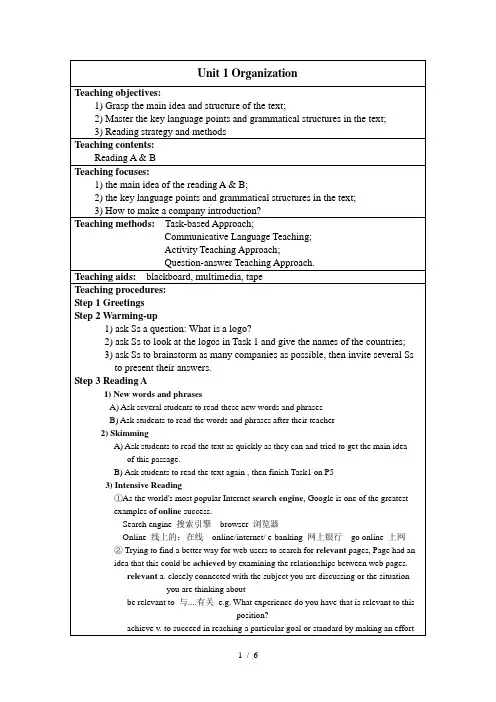
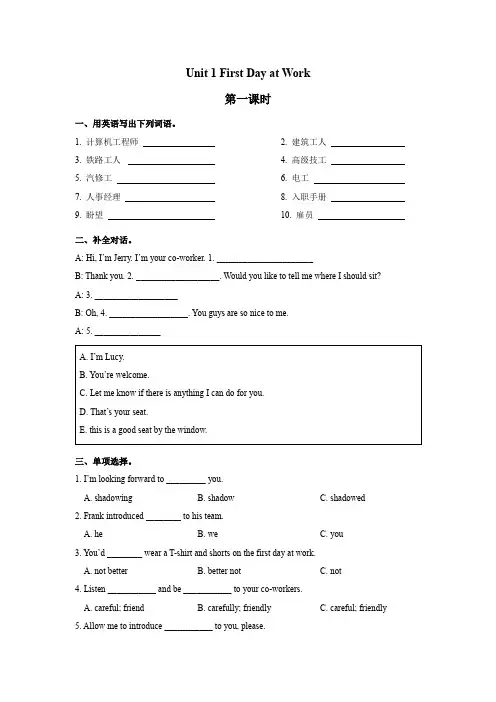
Unit 1 First Day at Work第一课时一、用英语写出下列词语。
1. 计算机工程师2. 建筑工人3. 铁路工人4. 高级技工5. 汽修工6. 电工7. 人事经理8. 入职手册9. 盼望10. 雇员二、补全对话。
A: Hi, I’m Jerry. I’m your co-worker. 1. ______________________B: Thank you. 2. ___________________. Would you like to tell me where I should sit? A: 3. ___________________B: Oh, 4. __________________. You guys are so nice to me.A: 5. _______________三、单项选择。
1. I’m looking forward to _________ you.A. shadowingB. shadowC. shadowed2. Frank introduced ________ to his team.A. heB. weC. you3. You’d ________ wear a T-shirt and shorts on the first day at work.A. not betterB. better notC. not4. Listen ___________ and be ___________ to your co-workers.A. careful; friendB. carefully; friendlyC. careful; friendly5. Allow me to introduce ___________ to you, please.A. meB. myselfC. my四、连词成句。
1. you, in the morning, your, should, on, the orientation manual, desk, read___________________________________________________________________________ 2. work, you, your, start, in the afternoon, should, to, on, site ,with, colleagues___________________________________________________________________________ 3. he, be, next, supervisor, your, for, will, the, three, months.___________________________________________________________________________ 4. you, our, will, I, give, tour, of, factory, a___________________________________________________________________________ 5. hearing, I’m, forward , to, how you get on, looking___________________________________________________________________________第二课时一、词义配对。
Unit 1 第一课时针对训练一、完成对话A: When are you leaving?B: This afternoon. My flight leaves at 4:30. 1A: 2 So I can see you off this afternoonB: It's so kind of you. 3A: I'm going to get a job and make some money. How about you?B: I'm going to visit my sister for a month. She has a house in New York.A: What are you going to do there?B: Take a break! The weather is going to be warm and my sister has a pool.A: 4 And then what?B: 5 Maybe I'll visit some friends in Toronto.A: Sounds like a wonderful vacation!A.Sounds great!B. What about you?C. I'm not sure.D. I'm catching the morning train tomorrow.E. Do you have any plans for summer vacation?1. _______2. _______3. _______4. _______5. _______二、词义配对( )1. vocational A.名字( )2. manager B.介绍( )3. energetic C.社区( )4. given name D.高中( )5. introduce E.经理( )6. community F.职业的( )7. high school G.消防员( )8. firefighter H.快递员( )9. delivery man I.空中乘务员( )10. flight attendant J.精力充沛的三、单项选择( )1. —Who is_______, Mary or Lily?—Mary.A.youngB. youngerC. the youngestD.the younger( )2. Could you tell me _______about yourself?A.nothingB.someC.anythingD.something( )3. I'd like to introduce my best friend Tony _______you.A. WithB.atC.forD. to( )4. Children like eating snacks in the sofa while they _______ funny cartoon movies.A.are enjoyingB. enjoysC.are going to enjoyD. were enjoying( )5. —Who _______ the piano?—My sister, when she _______ time.A.plays; hasB. is playing, hasC. plays; is havingD. is playing, has had一、单项选择( )1. The old man often feels _______ because his children live far away.A.crazyB. lonelyC. aloneD. sleepy( )2. I love singing and dancing.I want to be _______ actor in the future.A.aB. anC. theD. /( )3. Lucy's father works in No.1 Hospital. He is a _______ .A.managerB. delivery manC. doctorD. policeman( )4. —Be careful when you are driving,______in a rainstorm like this.—Thank you.A.especiallyB. properlyC. probablyD. quickly( )5. Do you know the man ______ in the middle of the first row?A.sitB. sitsC. to sitD. sitting二、同义句改写1. The boy who is talking to the teacher is my friend.The boy ______ to the teacher is my friend.2.Emma and I are planning to throw a party.Emma and I are planning to ______ a party.3.I live with my mom, my dad, my twin sister Emma and Buddy—my puppy.I live with______ ______, twin sister Emma and Buddy-my puppy.三、完形填空May has an aunt who works in London. She loves May so much that she 1 May to London every summer. Last year May was 2 to go to London and see some famous places inLondon, including the British Museum, National Gallery and 3 amazing buildings. 4 beautiful! She fell in love with them, but one thing made her very unhappy. When she passed square 5 , a thief stole her wallet in her pocket. She had to walk to her aunt's home angrily. This year May's aunt invited her to 6 again. One day, when she passed the same square with her aunt, she was 7 not to be stolen. After a while, she saw a man go close to her and 8 his hand in her pocket with a smile, then put out the hand quickly and left. She becamevery angry and shouted, "Stop it, 9 I will call the police!" To her surprise, she found her aunt and all the other people there laughing with the word "Congratulations!" In fact, the man was not a thief. Instead, he put ten pounds in her the pocket. It was an 10 game. Organizers wanted to correct the bad impression (印象) of the square, so they hired some "thieves" to do that game.( )1. A.invites B. helps C.asks D. tells( )2. A.sad B.angry C. strange D. happy( )3. A.others B. another C.other D.the other( )4. A.How B. What C. What a D. What an( )5. A.lonely B.alone C.quiet D.quite( )6. A.Beijing B.Tokyo C.Paris D.London( )7. A.more careful B.careful C.carefully D. more carefully( )8. A.take B.put C.get D. want( )9. A.so B.but C.and D.or( )10. A.exciting B.interesting C.new D.surprising一、单项选择( )1.—How's everything going?—__________________A.How do you do?B.Nice to meet you.C. Long time no see.D.Quite well, thank you.( )2.—Grandpa's birthday is on next Saturday, and I'm planning a surprise party for him.—__________________. I'll bring some wine.A.Sounds like funB.It dependsC.Just a minuteD. You are welcome( )3.I_________studied at all last term. I'm going to study_________this term, for the exams are getting close.A.hard; hardlyB. hard; hardC.hardly; hardlyD. hardly; hard( )4.I only want you to come, _________others, I don't care.A.thoughB.howeverC.as forD.as long as( )5.In China, many parents _________their children _________some beautiful and interesting things.; for; after; in; as二、选词填空his great sense of humor, 1 his six-year-old daughter, Jane. Recently, one of Brown's closest friends 2 him to make a speech at a wedding. He prepared the speech carefully and went to the wedding with Jane. He told a large number of funny 3 in the speech and, of course, it was a great success. As soon as he had finished, Jane told him she wanted to go home. Brown was a little 4 but he did as his daughter asked. On the way home, he asked Jane if she had enjoyed the speech. To his surprise, she said she hadn't. Brown asked her 5 this was so and she told him that she did not like to see so many people laughing at him!三、阅读理解I was only nine years old, a third-grade student from the city of Shenyang, China, when I knew my life was going to change. I held my mother's hand, waiting at the railway station for thetrain to take us to Beijing, my new home. My father would be waiting for me.I had never been to Beijing, but I knew my life would soon be very different, harder, more challenging. I was already a gifted young pianist, but my father insisted I move to Beijing to improve my piano skills.Part of me would like to go; another part of was very sad. I would miss my friends, grandparents and teachers in Shenyang. Most of all, I would miss my mother. Still holding my hand, my mother looked down at me with her big brown eyes and a beautiful smile. I was trying to appear brave, but she had always been able to read my mind. "Do not feel lonely or afraid," she told me. "You are a very special boy. Your music will always be with you."In Shenyang, I had been playing the piano since I was two, and many people in my city considered me a prodigy. I had entered my first piano competition at age five. Newspapers hadwritten stories about me and published my photos. My father had long believed I would be great.Could I really succeed in Beijing? What if I disappointed my father? My mother helped to wipe away my tears. "Your father will meet us at the station. I don't want be separated from you, either. But I need to stay at my job in Shenyang. I am our family's only bread winner for now. Your father is trying his best to get you into the Central Conservatory of Music. He must find you a new teacher in Beijing. There is much work to be done before the entrance exam."( )1.Where would the writer begin his new life?A.In Shenyang.B.In Beijing.C.In his hometown.D.In the Central Conservatory of Music.( )2.The writer felt _____about leaving for a new place.A.excitedB.frightenedC. happy and sadD.disappointed and worried ( )3.Which of the statements is NOT true according to the passage?A.The writer was only nine years old when he left Shenyang.B.The writer started playing the piano when he was five.C. The writer's mother will not go with him to Beijing.D.The writer would go to the Central Conservatory of Music.( )4.What do we learn about the writer’s father?A.He worked in Shenyang.B.He is the teacher of the writer.C. He had full confidence in the writer.D.He was the only breadwinner in his family. ( )5.The writer's mother can be best described as _________.A.soft and caringB.kind but strictC. strict and braveD.nice but impatient第四课时针对训练一、单项选择( )1.—Where_______ your mother from?—She_______ from Hangzhou, Zhejiang Province.A. does; comesB.is; comeC.does; isD.is; comes( )2.Hello! My name is Xu Ming, a firefighter. My _______ name Ming means brightness.A.familyB.givenC. fullst( )3.We will go hiking if it ______tomorrow.A.rainsB.isn't rainyC.don't rainD.not rain( )4.Our English teacher is very_______ us in class, especially about our homework.A.strict withB.worried withC.interested inD.full of( )5.A(n) _______ person means the person has a lot of energy and enthusiasms.A.especialB.hardworkingC.handsomeD. energetic( )6.Long long ago, people found that the sun_______from the east.A.roseB.risesC.raisesD.raised( )7.My math teacher usually _______ a black jacket.A. WearsB.put onC.wearD.puts on( )8.What _______ your father and mother_______?A.does; doB.do; doC.are; doD.do; does( )9.Anna's parents _______ jogging every evening.A.goB.goesC.goingD. went( )10.—Who is the girl _______ under the tree?—She is my sister.A.readB.readsC. readingD.has read二、书面表达(一)假如你是李明,你从报纸上得知ABC公司需要招聘一个英文秘书,请你用英文给公司经理史密斯(Smith)先生写一封60词左右的求职信。